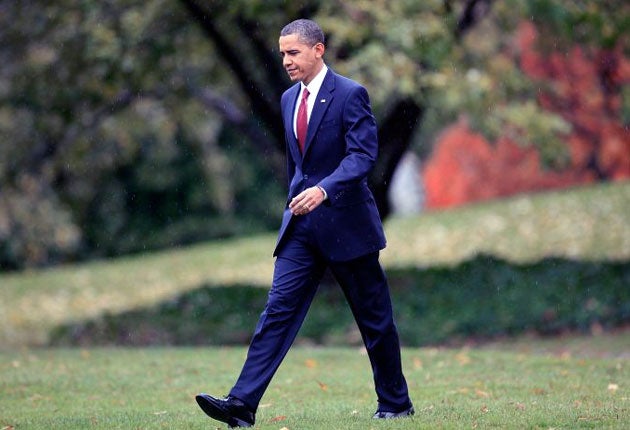Obama's advisers at war over Afghan conflict
President accused of dithering as leaked memo reveals bitter divisions over strategy in his inner circle

The West's military strategy in Afghanistan slipped even deeper into confusion yesterday after President Barack Obama flatly rejected all four options for increases in troop levels presented to him by his team of national security aides.
The delay was prompted in part by a last-minute bombshell from the US ambassador in Kabul. In two cables to the President, Karl Eikenberry argued it would be a bad idea to increase troop levels because of the ineptitude of President Hamid Karzai, who finally secured a second term last week after the fraud-marred mess of the August elections. By speaking up, Mr Eikenberry has put himself on a direct collision course with the US military leader in Afghanistan, General Stanley McChrystal. US commanders in Kabul greeted the envoy's intervention with dismay although some civilian officials believe the development gives Mr Obama a valuable breathing space in which to explore the least harmful ways out of a seemingly intractable situation. The procrastination may point to a possible swing in sentiment in Washington toward those who fear a Vietnam War-type quicksand.
Some significant new US deployments are eventually likely to be approved, but the delay weighs on the military planners not just of the US, of its Nato allies, with no decision now likely before early next month. "This will create immense problems for military planning on the ground. It could not have come at a worse time," said one senior American defence source in Kabul. British ministers meanwhile fear the splits in Washington will further erode public support for the war.
American and British commanders are desperate for more troops to stem the tide of the Taliban insurgency and say that every day that slips by without a clear commitment from Washington makes their task more difficult. The open divisions in the US, say diplomats, will make it even more difficult for the US to persuade other Nato members to expand their contributions. The Western strategy for the next phase of the war has been predicated on General McChrystal getting a significant proportion of the 40,000 troops he had asked for if the Afghan mission is not to fail.
The ambassador's two memos were sent to the White House last week and leaked to the US media after being debated at a Council of War on Wednesday. There is some suspicion that Mr Eikenberry leaked his own messages to get the President's attention. But their surfacing publicly at this juncture gives Mr Obama some cover for postponing a decision. Republicans have accused him of "dithering" but the leaks allow Mr Obama to send a message to voters that he is not allowing himself to be railroaded by military commanders and that he takes seriously those who want to know when and how America will get out of this war.
This is why the White House moved to issue a statement after Wednesday's meeting to stress the deliberateness of Mr Obama's pace. "The President believes that we need to make it clear to the Afghan government that our commitment is not open-ended," it said. And yesterday, he received back-up from Hillary Clinton, the US Secretary of State, who is believed to support additional troop deployments, but not as many as the 40,000 requested by General McChrystal. Mrs Clinton listed "corruption, lack of transparency, poor governance, absence of the rule of law" as the main lingering concerns about Afghanistan today.
Unsurprisingly, the Karzai circle did not take kindly to the amplification of US dissatisfaction. "We are committed in further fighting corruption as we prepare to form a new government," said a spokesman for Mr Karzai, Siamak Herawi, before adding: "At the same time, we want the international community to do more to eliminate corruption in spending aid money."
The frustration has only deepened since Mr Karzai won a second term. Spectacularly irritating to them was an interview last week, in which he implied that Afghanistan might be better off without the Americans anyway.
Mr Obama, who last night left for an eight-day tour of Asia, meanwhile faces growing headwinds from an American public fed up with the war. A CNN poll this week showed 58 per cent of Americans opposing the conflict and 56 per cent unhappy about sending in more troops.
Join our commenting forum
Join thought-provoking conversations, follow other Independent readers and see their replies
Comments
Bookmark popover
Removed from bookmarks